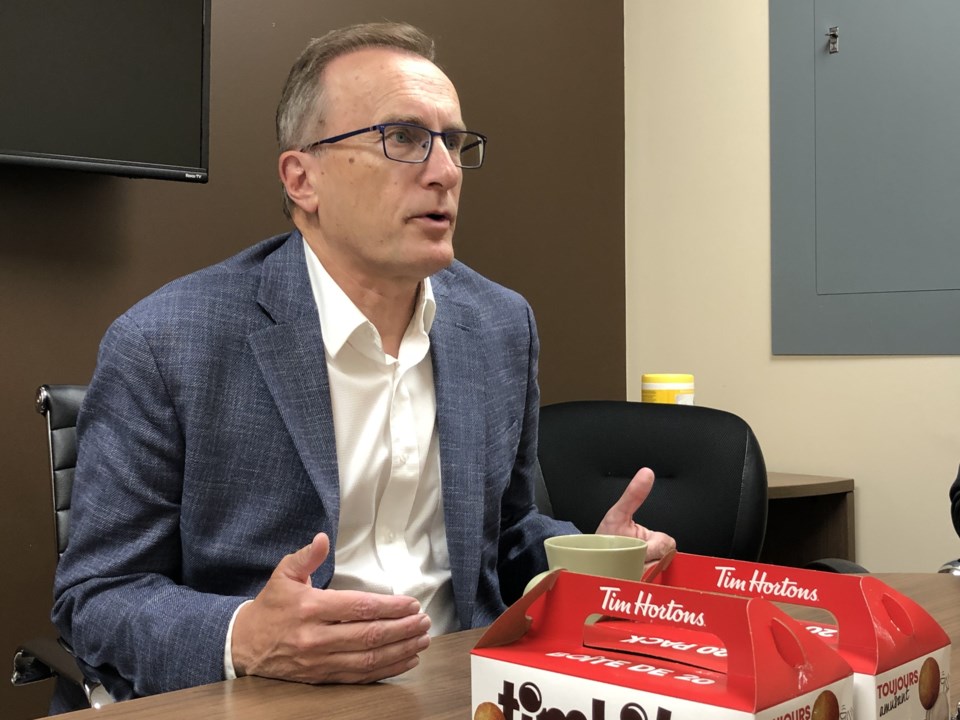MOOSE JAW — Moose Jaw’s business community is concerned with changes that the federal government has made to immigrant nominee programs and has expressed those worries to the province’s immigration minister.
The Hon. Jim Reiter was in Moose Jaw on July 24 to speak with businesses and the Chamber of Commerce about immigration issues, along with other issues connected to his portfolios of career training, labour relations and workplace safety.
Before his day began, Reiter spoke to the media in MLA Tim McLeod’s office about the concerns he’s hearing about immigration issues. He also touched on health care and finances.
Reiter said that the federal Liberals “control the gates” on the immigration programs and have “drastically scaled back” the number of nominees allowed into the provinces. He pointed out that Ottawa accepted 7,200 people last year through such initiatives, but, “for economic reasons,” cut that number to 3,600 this year.
Continuing, he said the feds tightened the restrictions on three-quarters of those positions, which means 2,700 must be filled from current temporary residents and not new or international immigration.
This has resulted in the Saskatchewan government limiting the industries where nominees can work, with the province targeting areas of health care, the skilled trades and agriculture since those areas need workers, Reiter added.
Meanwhile, Reiter said that provincial and territorial immigration ministers met recently with their federal counterpart, where they told her that they wanted more input on these decisions since they are partners and not general stakeholders.
“In our view, they (the feds) have caused some immigration problems, largely on the front of student visas and on the temporary (foreign workers) side,” he remarked. “And now they’re trying to fix the problems they’ve caused there with the provincial economic streams, which is just the wrong way to go.
“… We’re hopeful that we can get some changes from the federal government in the next while.”
Reiter had asked Ottawa in May for a two-year extension on work permits to allow immigrants to continue working. He noted that he raised that topic with the federal immigration minister during the recent meeting and learned the Liberals had granted extensions to only Manitoba and Yukon.
“So, the minister didn’t commit to it, (but) basically, she said she would look at this,” he said, noting he hoped for positive news this fall.
Reporters asked Reiter why Saskatchewan-born residents aren’t prioritized to fill some positions, with the minister saying the province and business community are attempting to “find that balance” between using immigrant nominees and native-born citizens.
Continuing, he said Saskatchewan has the lowest unemployment rate in Canada, while some sectors of the economy have greater needs for workers than others. He pointed back to health care, where recruiting workers can be difficult, and finding skilled tradespeople in areas such as electrical.
“So, it’s about finding the right economic streams, using the right labour force data, and (trying) to target the industries that need it the most,” Reiter said.
The minister noted that the Sask. Party had “significantly increased” training spots for nurses and doctors since forming government in 2007. Moreover, he thought it was about “attacking (the vacancies) from all fronts,” which included increased training and “an immediate need” for immigration.
Reiter also said that a “pragmatic approach” is required to address the issue of using foreign-born workers versus native-born ones, while it’s about doing what’s best for the economy and Saskatchewan citizens.
“So, I don’t view it as a left(-wing) or right(-wing) thing,” Reiter added. “I view it as … let’s do what’s best for the economy.”




